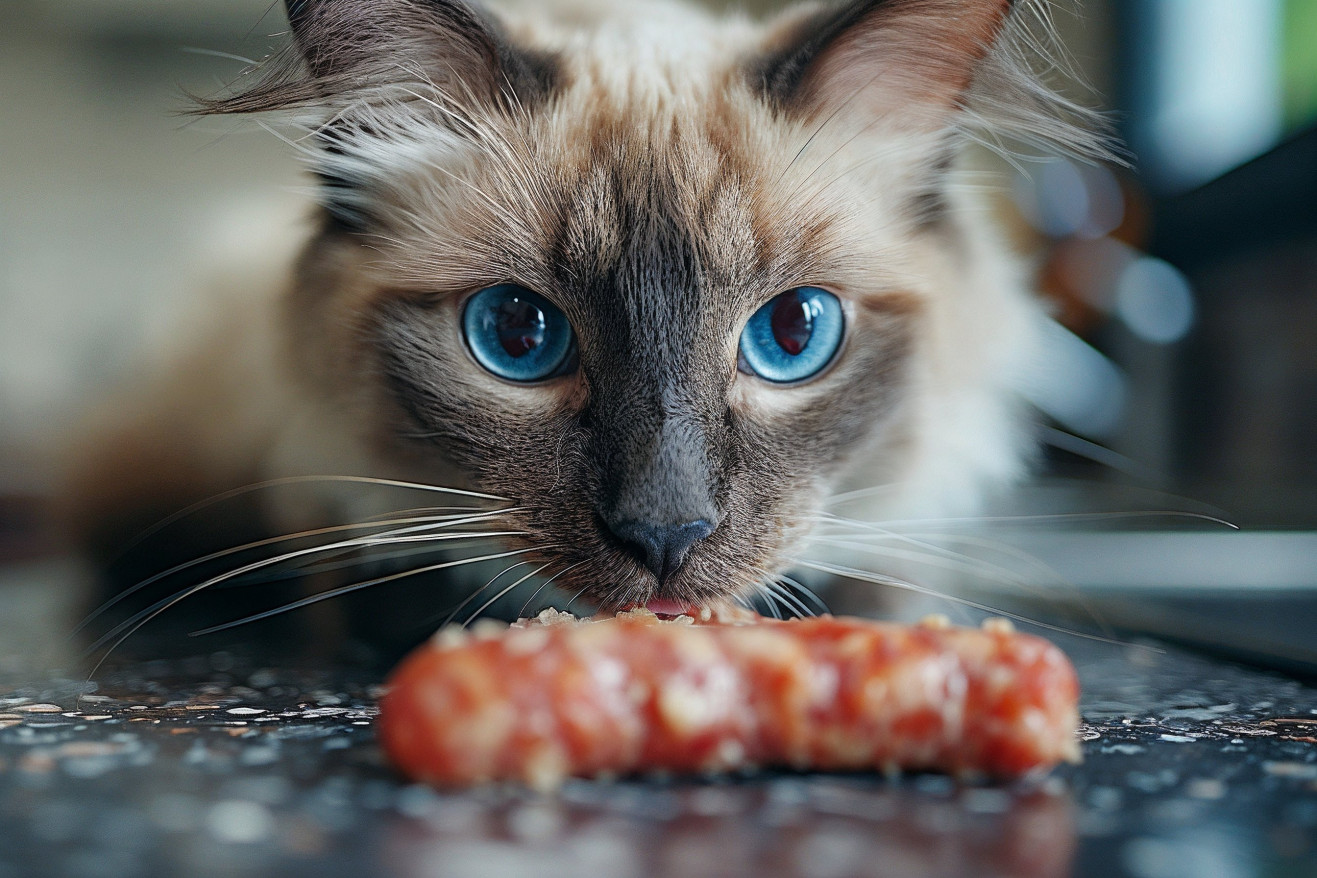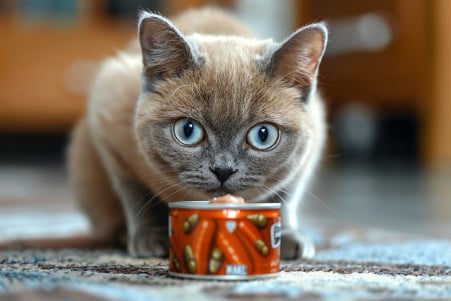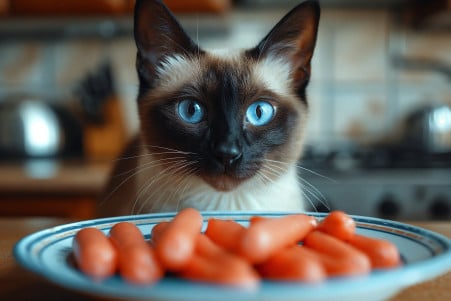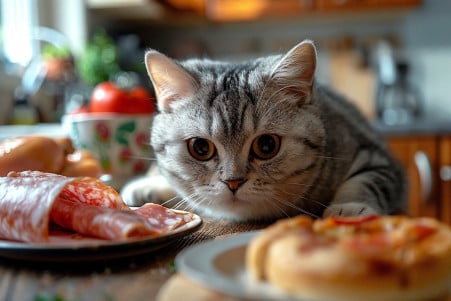Can Cats Eat Sausage? Understanding the Risks and Alternatives
5 February 2024

While sausages can be tempting, they don’t typically align with a cat’s nutritional or dietary needs. We do not recommend feeding sausage to cats because it is high in fat and salt, which can cause digestive upset and obesity.
Sausage also often contains preservatives and spices that can be toxic to cats. If you do decide to feed sausage to your cat, only feed it in small amounts as an occasional snack and make sure it is fully cooked.
To better understand the potential risks of feeding sausages to cats, we will explore the most recent research from veterinary nutrition and animal health. We will look at the nutritional needs of cats, the potential risks of processed meats, and the use of preservatives in cat food. By bringing this information together, we hope to offer a well-rounded view of why certain human foods may not support your cat’s health.
Can cats eat sausage?
Understanding What Cats Need Nutritionally
Because they are obligate carnivores, cats need a diet that is high in animal-derived nutrients. Both the American Animal Hospital Association and the Cornell Feline Health Center explain that cats have specific nutritional needs, including a high protein requirement and essential amino acids, such as taurine and arachidonic acid. A diet that is meat-based is required because these nutrients that are essential to a cat’s health are not found in plant materials.
Because they are obligate carnivores, cats don’t have the metabolic enzymes to handle a diet that is high in carbohydrates and low in protein. This is why the RSPCA explains that feeding cats human foods, such as sausage, is not recommended. This is because these foods don’t have the right nutritional balance, which can lead to deficiencies and health problems, as they are not formulated to meet the nutritional needs of cats.
In addition to not meeting a cat’s nutritional needs, human foods can also contain ingredients that are toxic to cats.
It is important to ensure that a cat’s diet meets their nutritional needs. Knowing the potential consequences of not meeting their strict nutritional requirements explains why feeding cats sausages or other processed meats can be bad for their health.
Dangers of Giving Sausage to Cats
Even though cats are obligate carnivores, sausage is not a healthy option and can lead to a number of health issues.
The high-fat content in sausage is especially worrisome because it can lead to obesity, which is already a common problem among house cats, and pancreatitis, which is an extremely painful inflammatory condition.
The high salt content in sausage can also lead to hypertension and make problems like heart and kidney disease worse, according to AnimalWised. In addition, Waldo’s Friends points out that many of the seasonings used in sausage, like garlic and chili pepper, are toxic to cats and can cause gastrointestinal upset.
Sausage also contains preservatives like sulfites and nitrates, which can be harmful to cats, especially in large amounts. Cats Protection explains that symptoms of poisoning can include vomiting, diarrhea, and even seizures or coma. In addition, if sausage is given to cats raw or undercooked, it can expose them to bacterial or parasitic infections, which can cause digestive problems and other more serious health issues.
Clearly, while sausage does contain animal protein, the potential downsides of feeding it to cats make it a poor choice and one that should be avoided. When it comes to your cat’s diet, it’s important to make sure that you’re feeding them a nutritionally complete and balanced diet, and that means prioritizing cat food over processed human foods like sausage.
Cat Health Concerns: The Dangers of Human Food
The dietary needs of cats are closely tied to their health. When a cat’s diet strays too far from those needs, it can result in health concerns like pancreatitis, which is caused by high dietary fat, and heart disease, in which sodium is a key factor.
An article on PetMD notes that a balanced diet is important in managing these conditions. Sausages, with their high fat and high salt content, can make these health issues worse in cats.
Studies cited on PubMed show that while increased sodium intake from high-salt diets isn’t harmful to healthy cats, it can lead to issues like hypernatremia when it’s consumed in high amounts.
The team at Oakhurst Veterinary Hospital warns that preserved meats that are high in salt can lead to this condition, which causes symptoms like vomiting and lethargy.
This makes it important to watch and control a cat’s diet. With the help of a vet and the right nutritionally complete cat food, pet parents can avoid the health problems that come with feeding cats the wrong human foods, keeping their feline friends healthy and happy on a proper diet.
Why Cats Need to Eat Meat
Meat is the foundation of a cat’s diet and provides important nutrients and vitamins that can’t be found in other food sources in the same quantities.
Since cats are obligate carnivores, they need a diet that’s high in animal-derived proteins and fats.
According to Crave Pet Foods, feeding cats high-quality meat-based cat food is the best way to make sure they get the essential amino acids they need, including taurine, which is necessary for heart and eye health. Meanwhile, omega fatty acids, which are found in chicken and salmon, help support skin and immune health, showing that meat has a number of benefits for cats.
The debate over raw meat diets for cats continues. Supporters claim that the diets have a number of benefits, including better body condition and fewer health issues. However, there are also a number of risks associated with the diets, including the possibility of exposure to pathogens and concerns about nutritional deficiencies.
Balanced raw meat diets may be helpful for cats with specific health issues, and they are often well-tolerated and can help with food allergies.
Studies have consistently shown that cats need meat to stay healthy, especially when comparing the health of cats on vegan diets to those on meat-based diets.
While sausage is a meat product, it doesn’t have the nutritional balance that cats need, and it comes with a number of risks because of the way it’s processed. To make sure your cat stays healthy and happy, it’s best to stick to high-quality, meat-based cat food that meets AAFCO standards, since that will be the best way to meet your cat’s dietary requirements.
Preservatives and Additives
Preservatives and additives are often used in processed meats, like sausage, and they can be bad for your cat. For example, butylated hydroxytoluene (BHT) and ethoxyquin are preservatives that are commonly used in sausages to prevent fat oxidation in pet foods.
According to Spot, these chemical preservatives can cause allergic reactions, gastrointestinal distress, and may even lead to cancer and organ damage in cats if consumed over time.
Meanwhile, Purrrfectly Holistic notes that propylene glycol and TBHQ are other preservatives used in processed meats that have been shown to have negative health effects, including the formation of cancer cells and DNA damage.
The use of synthetic preservatives versus natural preservatives is a topic of much debate. According to the Clinical Nutrition Service at Cummings School, Tufts University, consumer demand has led to the use of natural preservatives like tocopherols (Vitamin E) and ascorbic acid (Vitamin C), even though they don’t last as long.
Still, the fact that some synthetic preservatives have been associated with long-term health problems in pets has led to a movement away from them in favor of natural preservatives.
Pet parents should be sure to read the labels of the food they buy for their cats and choose products that use natural preservatives or, even better, don’t use any preservatives at all. This will help reduce the risk of their pets being exposed to the potential dangers of synthetic additives in sausage and other processed meats.
Final Thoughts: Feeding Your Cat
So, while sausage may be a delicious treat for humans, it doesn’t meet the complex nutritional requirements of cats. It’s obvious that cats, as obligate carnivores, need a diet that’s high in animal protein and essential nutrients, which sausage doesn’t offer. Plus, the health issues associated with the high fat, high sodium, and preservative content of sausage make it an inappropriate and potentially dangerous food for cats.
The case against feeding sausage to cats, from digestive problems to the dangers of toxic ingredients and the risks of preservatives, is strong. It’s important to stick to a diet that’s been designed specifically for cats in order to support their health and avoid nutrition-related health problems.
Good pet owners understand and meet the special dietary needs of cats. To make sure you’re doing what’s best for your cat, talk to a vet who can offer personalized advice on what to feed your pet. This will give you the peace of mind that comes with knowing you’re helping to ensure your cat’s health and well-being in the long run.


